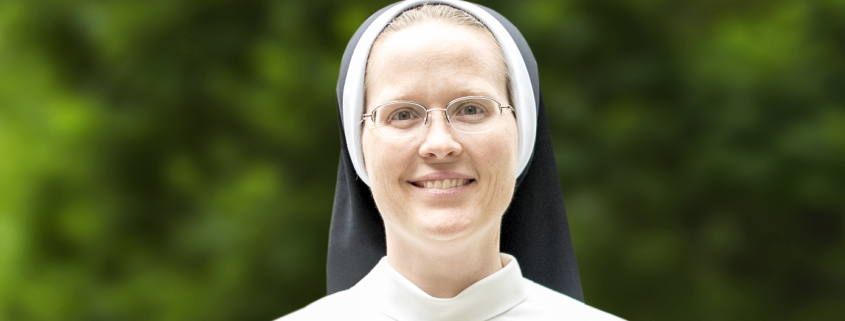Catholic College ‘Shaped Who I Am,’ Says Nashville Dominican
Sister Scholastica Niemann of the Dominican Sisters of St. Cecilia in Nashville, Tenn., is one of many religious sisters whose vocation was nurtured by faithful Catholic education.
Affectionately known as the “Nashville Dominicans,” her order was founded more than 150 years ago and has grown to nearly 300 sisters, with approximately 50 sisters in their initial four years of formation. The sisters, who wear the traditional Dominican habit, teach in 33 schools in the United States and several more abroad.
The Newman Society is grateful to Sister Scholastica for sharing her story and testifying to the influence of the faithful Catholic education that she received.
Newman Society: Sister Scholastica Niemann, can you tell us about yourself? Where are you from? What was the role of Catholic education in your life growing up?
Sister Scholastica Niemann:I grew up in a small town in East Tennessee and first met the Sisters at the grade school I attended, St. Mary’s School in Oak Ridge, Tenn.
Prior to living in Tennessee, though, my family moved around the country a lot because my dad was in the Air Force. One constant in the midst of all those changes was our Catholic faith. We knew the faith was important, because we saw the sacrifices my parents made to send us all to Catholic schools. I am the youngest of eight children, so that was quite a sacrifice.
So much of our life revolved around the parish and school, we were always involved in youth groups, in after-school activities and clubs, not to mention all the parish functions… the faith was so much at the heart of our family. The only Catholic high school in the area was about 50 minutes away, but there was never any question about whether we would go there or not. We just knew.
Catholic education was a priority in our house. Though it was never said aloud, I always understood how important the intellectual part of the faith was in our family.
Newman Society: Why did you choose to attend a faithful Catholic college? What was its impact on your life and your vocation?
Sister Scholastica Niemann:As a senior in high school I had just experienced a renewal of my own faith, a deeper conviction that friendship with the Lord was not only possible, but desirable. I had always loved learning, and now I was realizing that faith, and truth, and learning, and prayer all go hand in hand. And although I couldn’t have articulated it in these words, it is because the human person is made for the Truth who is Jesus Christ.
All I knew at that time was that I wanted to study the liberal arts in a faithful, Catholic environment. At the University of Dallas [a Newman Guide-recommended institution in Irving, Tex.] I got that… and a whole lot more than I bargained for. From my first English class, to the theology and philosophy courses, to Western Civ., I was receiving a vast treasure of an education that truly shaped who I am.
I would say the professors and classes had the most impact on me. They were challenging and rigorous, to be sure, but also immensely rewarding in a way that I had not anticipated. Very often after class, my friends and I would discuss the lecture or the reading, and we would just marvel at the inherent value of what we were learning. It was not useful, in a worldly sense, it was not job training or marketable—but it was true, and good… and eminently useful for us as human beings. We were learning how to succeed at being good people.
And then, on top of all that, to spend a semester in Rome, in the heart of the Church, to see where early Christians were martyred and buried in the catacombs, to walk the streets where St. Peter and St. Paul traveled, to pray in the magnificent churches, it was a once-in-a-lifetime experience.
All that time, Christ was drawing me closer to Himself.
Newman Society: How did you discern your vocation?
Sister Scholastica Niemann:As I neared graduation, I began to feel an interior tug, a nudge, a quiet invitation to consider Religious Life. I had taken a really beautiful course on Christian marriage, and part of that course examined the vows of consecrated religious life. It was there that a seed was planted—it took several years before I could respond to that call, but it was definitely a turning point.

